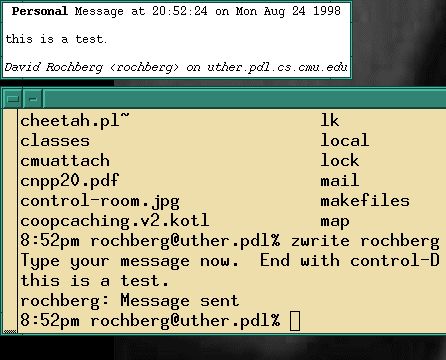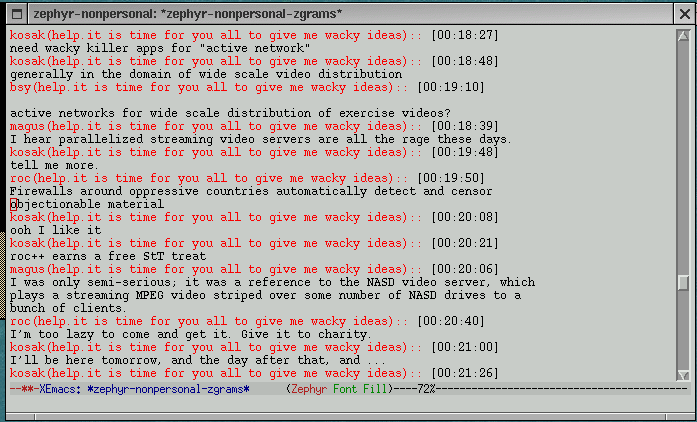
(page 19)
Public Zephyr
- zwrite and zwgc: probably the wrong way
- send: zwrite -i help
- subscribe:
- zctl add/sub message tennis '*' (temporary)
- zctl add/sub message '*' '*' (all broadcast messages)
- ~/.zephyr.subs for permanent additions
- emacs zephyr-mode: probably the right way
- Frequently Zephyred Questions (FZQ)
- Zephyr archives
(page 20)
Public Zephyr Culture
- common broadcast 'instances'
- help.*, chat.*,newsbites, graffiti, *.d,facilities.announce,facilities.discussion
- Topics: question/answer, whinging, debate, trip planning
- don't take the bitterati too seriously
- Don't sign messages
- Again, at least skim the FZQ for an intro
- zephyr is different in andy-land
- zephyr is not the world, nor is it real work
(page 21)
Emacs Zephyr Mode

(page 22)
Netnews (or 'bboards')
- newsgroups to read (more on web page):
- cmu.cs.scs required reading:important announcements
- cmu.cs.*.announce
new software or changes
- cmu.cs.general
general-interest items, no discussion
- cmu.misc.news
university news and announcements
- cmu.cs.discussion
do you want to graduate?
- cmu.cs.opinion
do you want to keep any friends?
- newsreaders:
- nn,trn,strn,gnus,netscape, outlook
- on a unix box, your news server is localhost
- (each machine runs DNNTP, a redirector)
- on an nt box, use dnntpd.srv as your server
(page 23)
Mailing lists
- cs-students, cs-newstu, cs-faculty, cs-support, cs-technical, scs-all
- extremely low volume
- You do not need to use these
- Even if you do, USE netnews post instead
- You do not need to filter them
- watch cc line when replying!!!
- to prevent accidents, do
- To: yourself@cs.cmu.edu
- Bcc: listname@cs.cmu.edu
(page 24)
Lower-tech communication
- Phone Documentation
- 'phone help' for dialing instructions
- 'man phones' for more
- 'phone transfer' for even more
- Phone directories
- csd
- phone (works for all sorts of stuff)
- phone langford
- phone fax
- phone chinese
(page 25)
Scheduling
- 'Calendar Boards' (cboards)
-
http://www-cgi.cs.cmu.edu/cgi-bin/cboard?ww
- or with the 'cboard' command.
- Ical (with some cboard integration)
- CorporateTime
(page 26)
/usr/local ('misc collections')
- software under /usr/local partitioned into N separate collections
- xemacs, purify, gcc, java, X11, mathematica, perl ...
- Some are maintained by facilities. The rest by other folks (mostly grad students)
- Problems with a collection: mail help@cs. They'll forward appropriately.
- You too can maintain a collection!
- LQ will smile upon you (as will the rest of the department) if you maintain a collection.
(page 27)
Your Workstation
- X setup
- choose wm (fvwm2) and/or desktop(KDE/gnome/none)?
- much software managed by depot
- to xlock or not to xlock? - I suggest not
- accounts for officemates - I suggest so
- lastbackup to see when last backup was run
- max local disk partition size is 2G.
- if you don't like your tickets expiring, see /usr/local/bin/kauthd
- root access; get josullvn.root kerberos ID
- 'xset +dpms' in your .xinitrc to turn on monitor powersaving.
(page 28)
Using AFS
- Figure out your mode.
- tradeoffs in keeping things on local disk vs. AFS
- speed, reliability, immunity to network failures
- may want to have emacs auto-save to local disk
- max backed-up volume size: 400 MBytes
- tradeoffs in keeping things on local disk vs. AFS
- be careful about permissions
- mode bits are irrelevant for access control
- read the facilities docs
- ~/OldFiles (also /afs/cs/.BACKUP/*)
- increasing workstation's AFS cache size
- fs setcache size_in_kbytes (<400,000)
Notes:
AFS is a network filesystem. That means that if you have no network, you lose. If you are careful to not touch any bits in AFS, a network-less machine can sometimes limp along for a while, but, at those unpleasant times when you're without AFS:
1. Your machine will grind to a halt unless you've been careful to use depot.pref.local to install useful tools on your local disk.
2. You won't be able to get at remote data.
Take a look at the zarchives/FZQ for info on what should go in your depot.pref.local to make your machine usable during an AFS outage.
(page 29)
Windows NT
http://www.cs.cmu.edu/~help/pc/index.html
- Don't discount MS productivity tools
- Revel in your relevance
- Software repository : \\monolith
- exceed for X windows stuff
- NT-AFS: files and instructions on monolith
- Peter Dinda has a FAQ
- NT-emacs
- tab-completion
- where to look for programming documentation
(page 30)
Emacs
Two are common
- fsf-emacs:
- run 'emacs'
- facilities maintained
- xemacs
- run 'xemacs'
- volunteer maintained
- better X support
- supports gnuclient -nw to attach to sessions
- xemacs is far far better.
- far.
- really.
- I'm not joking.
Notes:
Gnuclient -nw is really nice. The MO is this:
Leave an xemacs running at school.
Go home. Log in. Run 'gnuclient -nw' and voila; you have access to the xemacs session at school. This is a big win for keeping files synchronized.
(page 31)
Printing
http://www.cs.cmu.edu/~help/printing/
- Ask your officemates where the closest printer is.
- ask where the closest high-volume printer is.
- Use psxup to save paper
- The best way to make black & white slides:
- print to regular paper
- use 4th or 8th floor Xerox machines to copy onto high speed transparencies
- (ask in main office for your very own copier #)
- use slide1 to print color transparencies
- Printer is in 3610; go down the hallway of monitors and ring the bell
NOTE
psxup is a cmu-local name invented by KOSAK, the pstools maintainer
(page 32)
Other resources
- finger coke@cs
- chuck@cs is coke-dictator-for-life
- Coke Machine, StT
- Decfive/Amazon gateway
- Harry Bovik's files
- MOMSpider for web bugs
- Paul Heckbert's CMU SCS acronym list http://www.cs.cmu.edu/~ph/acronym
(page 33)
The RPP in computing
- Refill the printers
- or I will hunt you down like a dog.
- Don't leave the printers jammed.
- See above.
- Don't print big jobs during peak hours
- Ask facilities before you do strange things
- broadcast packets
- move hardware
- commercial anything
- looking through other people's files
- look for permissions in their .plan
- don't camp on the modem lines
(page 34)
A Note on Free Speech and the RPP
- In general, don't try to offend.
- In general, if you are offended, assume it was accidental.
- In general, if you offended somebody, apologize.
- Free Speech Areas
- cmu.cs.opinion
- most Zephyr instances (de facto)
(page 35)
A reminder (or 'do as I say, not as I do')
- Some of you (like me) will find it easy to spend the day in front of the machine and think that 'you're getting work done'
- None of these in excess will make you graduate
- extramural hacking
- window manager reconfiguration
- linux kernel-of-the-day keeping up with the joneses
- zephyr
- netnews
- surfing
(page 36)
Andrew: How the other half lives
- The rest of CMU uses 'Andrew'
- You will probably need to use Andrew to TA
- finger firstname.lastname@andrew to find your userid
- password = first 8 digits of your university ID (aka SSN, see the Hub for more.)
- You might have mail in your Andrew account right now
- Use 'wpi' to forward your mail (unless you crave IMAP)
- Use cross-realm authentication for sharing AFS files
NOTE
- (named after noted Andrews Carnegie and Mellon)
(page 37)
Andrew-continued
- Andrew bulletin boards are mirrored (with a chunky delay) as netnews in SCS (cmu.andrew',cmu.student...)
- Andy-land resources
- far-sun4.andrew.cmu.edu gets a fast sun (be Reasonable)
- lab of SGIs in 52xx cluster with softimage
- various clusters of NT boxes, linux boxen, SGIs (with softimage in 52xx), and Macs scattered around the campus.
- fancy digital art stuff in CFA cluster + synthesizers, slide scanner, video stuff, SGI Octanes
(page 38)
Weird I/O devices in SCS
- Wireless Andrew
- bribe advisor to buy you a wavelan card + laptop
- mannochmore: poster printer
- terminal room (WeH 3501):
- scanners
- zip drives
- jaz drive
- cd-r and cd-rw burners
- 4-,8- mm tape drives
- LCD projectors in most conference rooms
- pilot-link collection
-
http://www.cs.cmu.edu/afs/cs/misc/pilot-link/common/info/howto.html
- attach your cradle to your box
(page 39)
Home machines
- Do you want/need one?
- ADSL: available, partially subsidised
- SCS dialup pools: 56k, 33.6, SLIP/PPP/telnet
- man dialup
- 1-800 exists for logging in from conferences.
- docs (Linux,Macs & Windows)
- Campers: keep an eye on dialup pool usage
- for Unix: rpp-dial
- In general, http://zimbs.srv.cs.cmu.edu/cgi-bin/dialups
NOTE
CS 56k dialups are v.90, and the Andrew 56k dialups are USRx2.
Screen has its fans. Screen allows for luscious compute-from-home-over-flaky-dialups joy. You can even do screen+'gnuclient -nw'. a disconnection while you're using just gnuclient can kill the host xemacs.
(page 40)
Conclusion
- Visit the web notes and do the 'today' checklist.
- Always ask questions!
- Do good works for the community.
- Take care of your body.
- Be a reasonable person.
(page 41)
- cmu.cs.scs